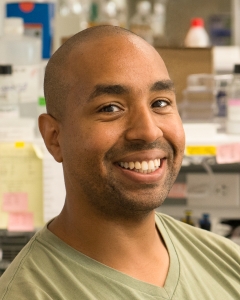Corey Harwell, 2018
Departed HMS

While at HMS
Who he is
Corey is a native of Louisville, Kentucky. He obtained his B.S. in Chemistry from Tennessee State University in 2000 and his PhD in Neuroscience from MIT in 2006. After working as a postdoctoral fellow at University of California, San Francisco with Arnold Kriegstein, he joined Harvard Medical School Department of Neurobiology in 2013.
What he does
The Harwell Lab is focused on understanding how lineage of neural cell types influences their mature function. His lab follows specific subgroups of neural progenitors through developmental time to understand the genetic and epigenetic programs that determine their ultimate fate. This work requires a multidisciplinary approach utilizing molecular genetics, molecular biology, and neural circuit mapping techniques to analyze the function of temporally defined subgroups of neurons in the developing brain. Together these diverse approaches provide a comprehensive picture of the molecular specification of distinct neuronal cell types and their functional relevance within circuits of the brain.
Current goals of the lab are to understand:
- The molecular and cellular diversity of forebrain progenitors
- Genetic and epigenetic regulation of cell fate and neuronal diversity
- Molecular mechanisms by which forebrain neurons are assembled into functional circuits
News from the Lab
The epigenetic landscape of neural stem cells is dynamically remodeled during neurogenesis. However, it is not understood how chromatin modifications in neural stem cells instruct the formation of complex structures in the brain. A recent report from the Harwell Lab showed that the histone methytransferase PRDM16 is required in neural stem cells to regulate lineage-autonomous and stage-specific gene expression programs that control the growth and organization of circuits in the brain. PRDM16 functions to regulate the epigenetic state of noncoding regions of the genome known as enhancers that control the expression of genes involved in neuron production and migration. These finding provide new insights into how epigenetic control of transcriptional enhancers in neural stem cells determines the organization of the mammalian brain.


